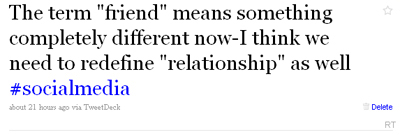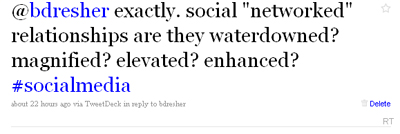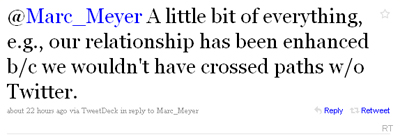This is a post where I am right but so is Brian…
So yesterday I was talking via Twitter with Brian Dresher, the manager of social media at USA Today. The discussion brought on by this tweet/thought:
Brian followed that thought up with mentioning that “following” someone pre-Twitter meant something more akin to stalking than it did to something more related to complimentary. You got that right.
There was a bit more to the conversation but here’s the point that I want to get across- and I’m fairly certain that you would agree with me. If you don’t, that’s OK, these thoughts are my own.
Like it or not, Social networking is redefining terms of “social endearment.”
It’s forever changing the etymology of commonly used words; and I would say easily within a few years it will completely alter their understanding and perception as younger generations continue to evolve as digitals’ new natives.
Here are the prime and most glaring examples.
- Friend-Means absolutely nothing anymore. All it means is that we have allowed the other into our networks, or vice-versa. Soon we will have to qualify what kind of friend you or they actually are.
- Follow-At its core, to follow would mean to come or go after; proceed behind; go in a straight or obvious course. There is nothing in the social networking world that resembles that definition. But as it stands now, if I were to tell you that I follow him or her-there still might be a pregnant pause. That too will soon change.
- Like-I don’t even know where to begin.
- Relationship-the definition of the relation connecting or binding participants in a relationship would seem to closely align itself with today’s social networks. However, some now think that relationships can be built on the thinnest of determinants. Which lead to this next tweet from me:
It took Brian’s next tweet to add the proper context to all of this.
He’s right. I didn’t know Brian before all this social networking “stuff” started and now we have a casual business relationship because of it. It has become enhanced because of it. We have met and talked at a conference, and later this summer he is going to host a Social Media Tweetchat for us. Thanks to the power of social networks.
Is there a fallout to all of this? No not really. We’re just adding layers to the complexity that is online communication. In order to get to or take a relationship to the next level, They’ll still have to be consummated at some point offline. Right? Maybe not? Maybe these new layers allow for less physical/face to face interactions?
Maybe not.
*I know there were a ton of other “social” words that don’t mean the same thing as they used to that I did not mention. I’ll leave that up to you guys. Anyone want to start a wiki?




Mark, great post and I’m honored to have played a role in its creation! The amazing thing about technology is the way in which our comfort level with usage and interpretation becomes more liberal as it becomes more widespread. Remember when cell phones were used for “emergencies only”? Now, they’re used virtually during any moment of alone time driving or walking. Similarly, many of us on Facebook originally restricted our “friend” list to…friends! As “social endearment” comfort and Facebook itself evolved, so did our comfort level with who we refer to and accept as friends.
I don’t think this means that we’re spiraling toward relationship confusion. Rather, I agree with you that we will increasingly qualify the social endearment term itself. For example, I now find myself sometimes saying, “Do I know person X? Oh yes, we’re Facebook friends.” I feel that this qualification – Facebook friends – is understood to mean that we have a type of relationship via social networking, but this doesn’t necessarily extend itself to us having heart-to-heart conversations in the real world. Can it happen? Sure, but it is a different type of relationship than our traditionally formed friendships. Of course, as you rightly point out, younger generations may have a very different take on what you or I interpret as “friends” or “social endearment.”
At the same time, I continue to be humbled and amazed by relationships formed on Twitter that do feel and are real. At many conferences now, I find myself exchanging more hugs than handshakes because of our social connectedness. Furthermore, I wouldn’t be surprised if folks have the ability to write compelling, genuine LinkedIn recommendations because of the types of virtual relationships where intelligent insights are exchanged and personalities are exposed.
For all of the nuances you have identified with “social endearment” terms, imagine how this is magnified in languages other than English. Concepts or terms such as “like”, “poke”, “unfriend”, etc. can take wildly different meanings in other cultures where a literal translation could be offensive or just flat out doesn’t work.
heh this is a common debate in Australia – when is a friend a friend and when an acquaintance?
i think the confusion came when we started calling virtual or online communities “social” networks. I never understood social to mean “party” private, or family/friends- it always meant “society” to me – including family/friends but also politicians, Britney Spears, ex husbands and company managers. the whole gamut. We just dont have a word in English for this relationship – is Britney Spears an acquaintance?:p
If following has turned us into stalkers its just because we have disintermediated the paparazzi etc – we now get our gossip direct from our celebrities & heroes, even small local ones.
Other than that I dont really see any new behaviour. If Twitter is a party, chatting with a stranger or listening to a group discussion looking for a point of similarity is pretty typical, dont you think? 🙂
Laurel @SilkCharm
@Laurel Watered down comes to mind when defining a virtual friend, an online relationship, and a “social” networked acquaintance but with a caveat. All of these types do have the potential to blossom into something, albeit better, possibly worse-I suppose we could look at the whole thing as some type of uber “warm” lead gen machine. Either way, the lexicon, It is “a-changin”…comes to mind rather easily. To your question- not only is Twitter a party, it can be a party that you go to uninvited and still wake up the next morning with a smile on your face.
@Brian, I should say or should have prefaced my post by saying that I’m not complaining. Social networks, warts and all, have had a transformative impact on me-all for the good. I completely agree with your sentiments.
To be clear, Marc, do you suggest a social network redefines friendship — or what I think you mean, a social networking site is the cause?
Facebook and Twitter are examples of an SNS; a Facebook group or a Twitter hashtag chat are examples of a SN.
@Ari thanks for the education. I’m saying neither. I”m saying that the terms as we know them now refer to different definitions/ the lexicon is virtual as are the relationships. They are platform and network agnostic.